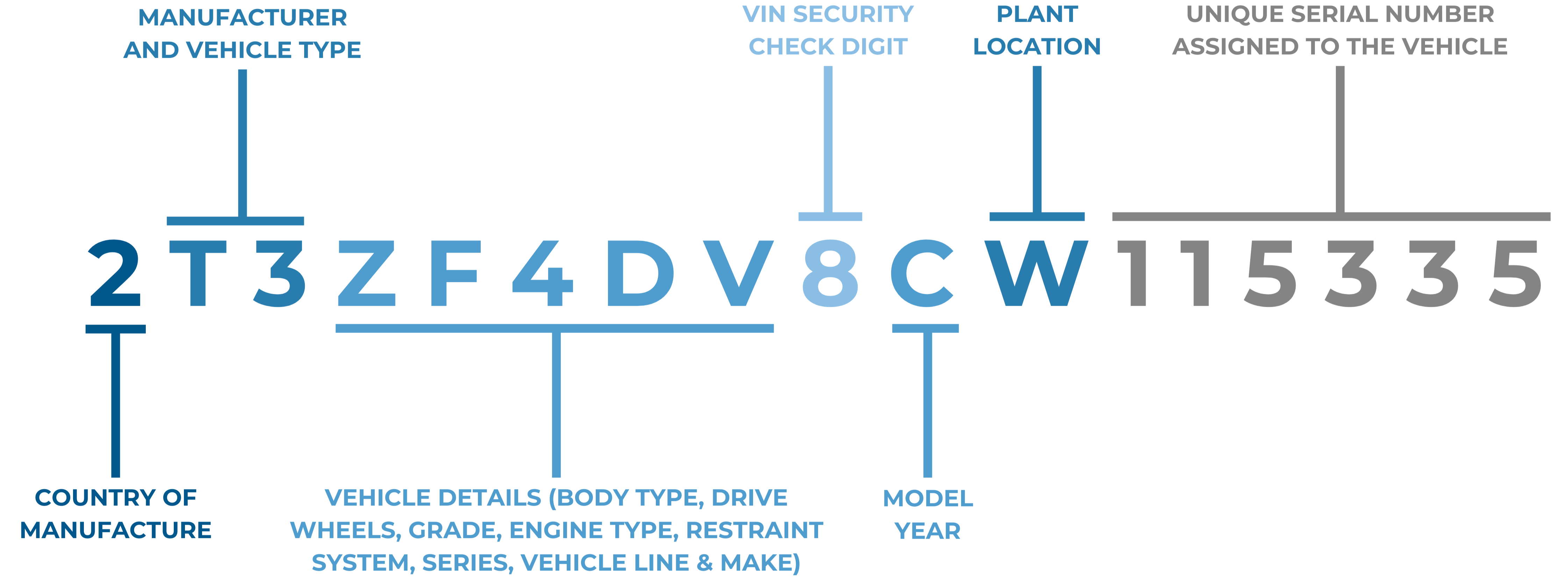
A Toyota VIN checker is like reading a car’s life story. But instead of childhood memories, you get accident reports, title changes, and past ownership records. That’s way more helpful when buying or selling a car. Think of it like checking a dating profile before a blind date. After all, no one wants surprises—especially hidden salvage titles or major mechanical problems. A quick Toyota VIN number check helps you avoid those headaches.
Whether you’re buying, selling, or just curious, a Toyota car VIN check is a must. It reveals key details, including accidents, recalls, title history, and previous owners. Best of all, you get all this info from a single Toyota VIN number.
Selling your Toyota? A clean VIN report makes buyers feel more confident. So, don’t wait—get yours today!
In this guide, we’ll explain how to check a Toyota’s VIN. Plus, we’ll show why this step is crucial for making smart car-buying choices.
What is a Toyota VIN Number?
A Vehicle Identification Number (VIN) is a special 17-character code assigned to every Toyota. It holds key details, such as:
- The country where the car was made
- Manufacturer information and factory location
- Vehicle model, engine type, and trim level
- The year it was built
- A unique serial number
More than just a code, a Toyota VIN can reveal hidden problems in a vehicle’s past. That means running a Toyota VIN check before buying or selling helps you avoid surprises. Whether you need to confirm specs or uncover past issues, this small code provides big insights!
Why Do a Toyota VIN Number Check?
A Toyota car VIN check helps buyers, sellers, and businesses confirm a car’s history. It prevents risks and ensures smooth transactions. Here’s why it matters:
For Buyers
- Verify Vehicle Authenticity – Confirms the Toyota’s VIN matches official records and helps prevent fraud.
- Check Accident & Title History – Reveals past crashes, salvage titles, and flood damage. Plus, it shows structural issues.
- Spot Odometer Fraud – Confirms mileage accuracy. That way, you can avoid scams and hidden problems.
- Check Open Recalls & Repairs – Identifies unresolved safety recalls and past maintenance records. This ensures a safer purchase.
- Assess Market Value & Sales – Compares pricing with similar models. At the same time, it confirms past sales transactions.
For Sellers
- Boost Buyer Confidence – A clean VIN report reassures buyers. As a result, it speeds up the sales process.
- Justify Pricing – A well-documented history helps set a fair price. This makes negotiations easier.
- Avoid Legal Issues – Confirms no hidden liens, recalls, or theft records exist. That way, you prevent disputes.
- Highlight Repairs – Shows proper upkeep. As a result, resale value increases.
- Prevent Fraudulent Transactions – Ensures the VIN details match official records. This step helps prevent scams.
For Dealerships & Businesses
- Verify Trade-Ins & Resale Cars – Identifies potential issues before acquiring used vehicles. This reduces financial risks.
- Ensure Compliance & Safety – Confirms recalls, legal status, and past repairs. As a result, customers stay protected.
- Evaluate Loan & Lease Status – Checks for outstanding liens or unpaid financial obligations. That way, dealerships avoid complications.
- Prevent Fraud & Theft – Detects stolen or cloned vehicles before purchase. This safeguards inventory.
- Support Pricing & Inventory Decisions – Helps dealerships set fair market values. Plus, it improves stock management.
For Insurance & Lenders
- Assess Risk & Premiums – Evaluates accident history and theft records. This helps determine fair insurance costs.
- Validate Claims – Confirms accident and repair records. As a result, it prevents false claims.
- Ensure Loan Security – Verifies the title status before approving financing. That way, lenders reduce risks.
- Detect Fraudulent Activities – Prevents financial fraud and false reports.
- Enhance Underwriting Decisions – Helps insurers determine policy terms based on vehicle history.
For Enthusiasts & Collectors
- Confirm Authenticity & Rarity – Verifies production details and original specifications. That way, buyers get genuine models.
- Assess Historical Significance – Identifies rare or classic Toyota models. Helpful for enthusiasts.
- Evaluate Modification Records – Ensures upgrades align with factory standards.
- Determine Restoration Needs – Checks previous damage and repair history.
- Support Resale & Investment Value – Provides official documentation for collectors and buyers.
A Toyota VIN check is a smart move. It helps buyers avoid bad deals. Sellers make fair sales. Businesses reduce risks. Running one before any deal ensures transparency and confidence.
How to Do a Toyota VIN Check
Checking a Toyota’s VIN is easy. Just follow these simple steps to get a full vehicle history report.
Step 1: Find Your Toyota’s VIN
First, locate your Toyota’s VIN number. It is usually found in these places:
- Dashboard: Look near the windshield on the driver’s side.
- Driver’s Side Door Jamb: Check inside the door frame.
- Vehicle Documents: Find it on the title, registration, owner’s manual, or insurance papers.
- Engine Bay: Look on the firewall or the vehicle’s frame.
Step 2: Use an Online Toyota Car VIN Check
Next, enter your VIN into a Toyota VIN number check tool. Websites like VinCheck.info offer free reports. These reports provide important details about the vehicle.
Checking the report closely can save you from expensive mistakes and help you pick a safer, more reliable ride.
Step 3: Review the Vehicle History Report
Carefully go through the Toyota VIN check results to spot possible warning signs. Pay close attention to these key areas:
- Theft and Title Fraud Checks: Make sure the vehicle isn’t stolen or branded as salvage or rebuilt before purchasing (similar to NICB).
- Sales Records: Review past transactions and odometer readings to spot potential fraud or unexpected issues.
- Toyota Factory Specifications: Compare trim levels, engine types, and transmission options to find the right match for your needs.
- Accident History and Damage Reports: Check for past crashes, airbag deployments, or structural damage to understand the car’s condition.
- Toyota Recall Information: Look up open recalls affecting safety or performance, along with details on required repairs.
- Vehicle Market Value: Estimate the fair price by considering mileage, condition, and location before negotiating.
- Ownership Costs and Depreciation Trends: Learn about long-term expenses and how resale value changes as the car ages.
- Lien and Loan Records: Verify that the vehicle has no unpaid loans or financial claims before finalizing the purchase.
- Toyota Warranty and Coverage Details: Understand coverage options, expiration dates, and expected repair costs to avoid surprises.
- Toyota Safety Ratings and Crash Test Results: Check NHTSA and IIHS-HLDI data to assess crashworthiness and safety features.
Just follow these steps to get key details about your Toyota. It’ll help you make a smart choice before buying or selling.
Understanding Toyota VIN Codes
Decoding a Toyota VIN number allows you to extract key information about the vehicle. Here’s a breakdown of what each section of a Toyota VIN code represents:

- 1st Character: Country of manufacture (e.g., J for Japan, 4 for the USA)
- 2nd-3rd Characters: Manufacturer and vehicle type
- 4th-8th Characters: Vehicle details (body type, drive wheels, grade, engine type, restraint system, series, vehicle line & make)
- 9th Character: VIN security check digit
- 10th Character: Model year (e.g., D = 2013, F = 2015)
- 11th Character: Plant location
- 12th-17th Characters: Unique serial number assigned to the vehicle
Using this information, you can cross-check the VIN details with Toyota’s official records to confirm vehicle authenticity.
Common Issues Found Through a Toyota VIN Check
Salvage or Rebuilt Titles
A Toyota VIN number check reveals if an insurance company labeled the car a total loss. As a result, this lowers resale value and raises insurance costs.
Recall Notices
By running a VIN lookup, you can discover open recalls. In addition, it shows whether the necessary repairs were done.
Stolen Vehicle Reports
Checking the VIN confirms if someone reported the car stolen. This way, you avoid legal trouble and financial loss.
Hidden Accidents & Frame Damage
A Toyota VIN history check uncovers past accidents, airbag deployments, or frame damage. Unfortunately, some sellers try to hide these problems.
Odometer Rollback & Mileage Fraud
A Toyota VIN check detects mileage inconsistencies. Because of this, it helps uncover odometer tampering and protects buyers from fraud.
Frequent Ownership Transfers
If a car had several owners in a short time, this might suggest hidden mechanical issues exist.
Insurance & Damage Reports
A Toyota VIN number lookup reveals past insurance claims. More importantly, it shows major repairs or flood damage that could affect reliability.
Final Thoughts
A Toyota VIN check is more than a step; it helps you make smarter choices with confidence. Before you buy, sell, or repair a car, a Toyota VIN lookup reveals key details about its past. For example, it can uncover accidents, title issues, or hidden problems that might change your decision.
By using this simple check, you avoid unexpected issues and feel more secure in your choice. So, always complete this step—it may save you time, money, and stress in the future!
Know your transmission inside and out—start your VIN Lookup today!